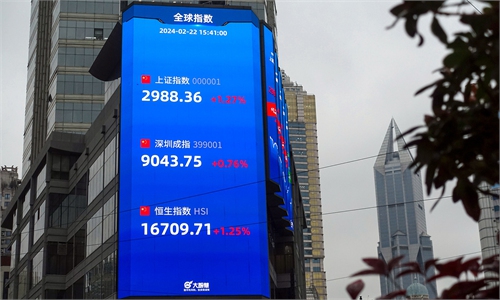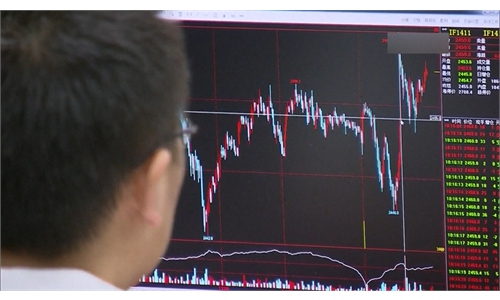Foreign capital actively invests in yuan-denominated assets
Analysts urge patience, confidence in Chinese economy, A-share equities

A view of Shanghai's Lujiazui area, a major financial zone in China Photo: VCG
Foreign capital and international financial institutions are expanding their investment in the Chinese market following the release of better-than-expected first-quarter economic data and high-level opening-up in the financial sector. Industry analysts said that the long-term investment value of yuan-denominated assets will be more outstanding, as the continuous economic rebound and stepped-up policies will provide a stable environment for overseas investment.
On Wednesday, global leading multinational bank Standard Chartered formally opened a branch in Hefei, East China's Anhui Province, in a move to strengthen the company's business in the Yangtze River Delta region.
"We will fully give play to the network advantage of Standard Chartered across the globe, especially markets along the Belt and Road Initiative (BRI), to actively support the global development of local companies [in Anhui] and help foreign enterprises set up businesses in the province,'' Zhang Xiaolei, head of Standard Chartered China, was quoted as saying in a press release sent to the Global Times.
BNP Paribas has won approval from the Chinese securities regulator to set up a fully owned securities brokerage in China, becoming the fourth wholly owned securities company in China. The unit, with registered capital of 1.1 billion yuan ($152 million), will be set up in Shanghai, according to a statement on the website of the China Securities Regulatory Commission (CSRC).
In the first quarter, foreign investors saw a net increase of $41.6 billion in their holdings of China's domestic bonds, another signal that international financial institutions are actively investing in yuan-denominated assets, according to the State Administration of Foreign Exchange.
The stable inflow of foreign capital into China shows that the country remains a promising destination for foreign investment and top choice for establishing businesses, analysts said, noting that the continuous inflow of foreign capital injects vitality into the Chinese economy.
The investment value of the A-share market is increasingly remarkable, which, along with resilient economic fundamentals and support policies, offers long-term opportunities for investors, Yang Delong, chief economist at Shenzhen-based First Seafront Fund, told the Global Times.
Yang said the country's monetary policy will remain relatively relaxed during the second quarter in order to maintain the GDP growth rate.
"In addition to interest rate and reserve requirement ratio cuts, effective measures should be taken to guide money flows into the real economy and help the development of companies that really need loans in order to stimulate demand," he said.
Yang called for patience and confidence in the Chinese economy and A-share market, stressing that value investing will bring excess returns.
Despite temporary internal and external challenges and difficulties, the Chinese economy's overall trend of steady, long-term growth will not change, and the country will cultivate advantages supporting its long-term growth on the basis of achieving economic prosperity in the short term, analysts said.
This month, the CSRC has announced multiple measures to boost cooperation between the capital markets of the Chinese mainland and Hong Kong. For example, the scope of eligible exchange-traded funds under the Shanghai-Hong Kong and Shenzhen-Hong Kong stock connect programs will be expanded.
Yang said that the improvement of the stock connect programs will help build a foundation for the further opening-up of China's capital market, injecting new impetus and vitality into the A-share market.
In a rare upgrading this year, UBS Group AG raised its recommendation on a key Chinese stock index to overweight, noting that the largest stocks in the index have been generally fine on earnings and fundamentals, Bloomberg reported on Wednesday.
About 200 A-share companies have released their first-quarter results so far. More than 80 percent reported better-than-expected revenue growth, mirroring the high-quality development of listed companies under a raft of targeted policies to bolster the healthy development of the capital market.
Recently, the State Council, the country's cabinet, released a guideline on strengthening regulation, forestalling risks and promoting the high-quality development of the capital market. This was the third guideline on the capital market issued by the State Council in two decades.
"The release of the new guideline embodies the high importance that policymakers place on the capital market. Meanwhile, the CSRC has tightened delisting regulations and started soliciting public opinions on six draft rules covering regulations on issuance, listed companies, securities companies and trading.
"All of these measures show that the strategic importance of the capital market in China's economic growth is rising further," Meng Lei, a strategist for UBS Securities Co, UBS' foreign-invested fully licensed securities firm in China, noted on Wednesday.
Meng said that the upgrading of profit expectations and supportive policies boosting high-quality development will inject new impetus into the A-share market in the second quarter.
"Along with the improvement of market sentiment and the economy, northbound capital will gradually return to the A-share market," Meng said.
In March, China unveiled an action plan aimed at further attracting and utilizing foreign investment.
It outlined 24 measures across five key aspects such as expanding market access and aligning domestic regulations with high-standard international economic and trade rules. The action plan further underscored the country's commitment to attracting foreign investment and enhancing confidence in investing in China by strengthening positive interactions with the global economy.



